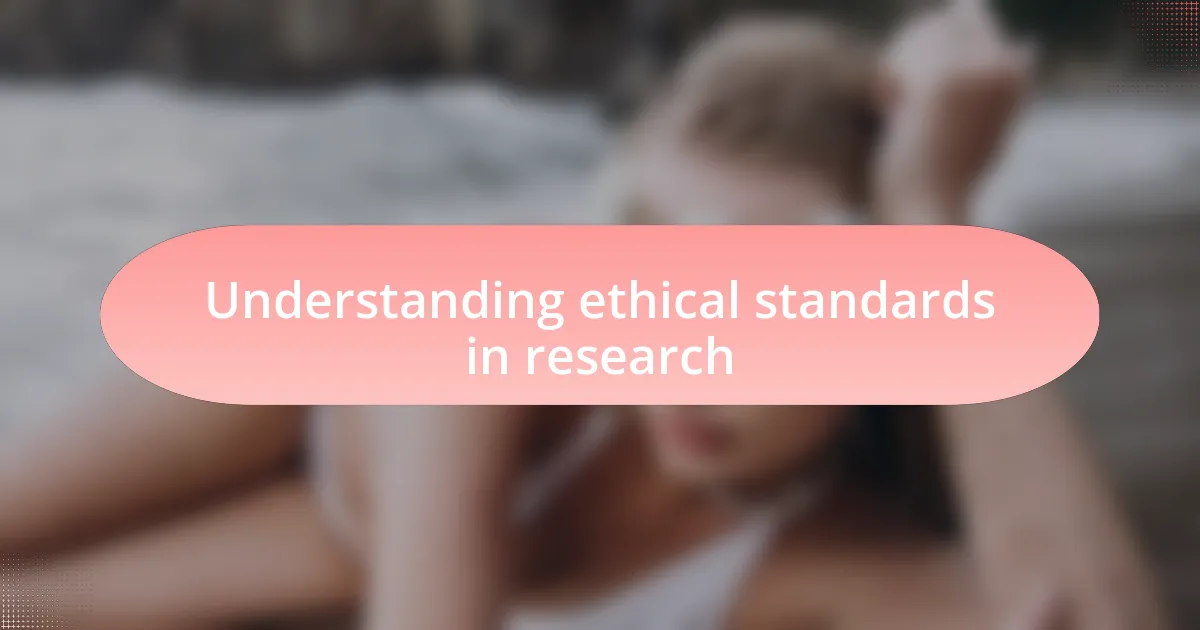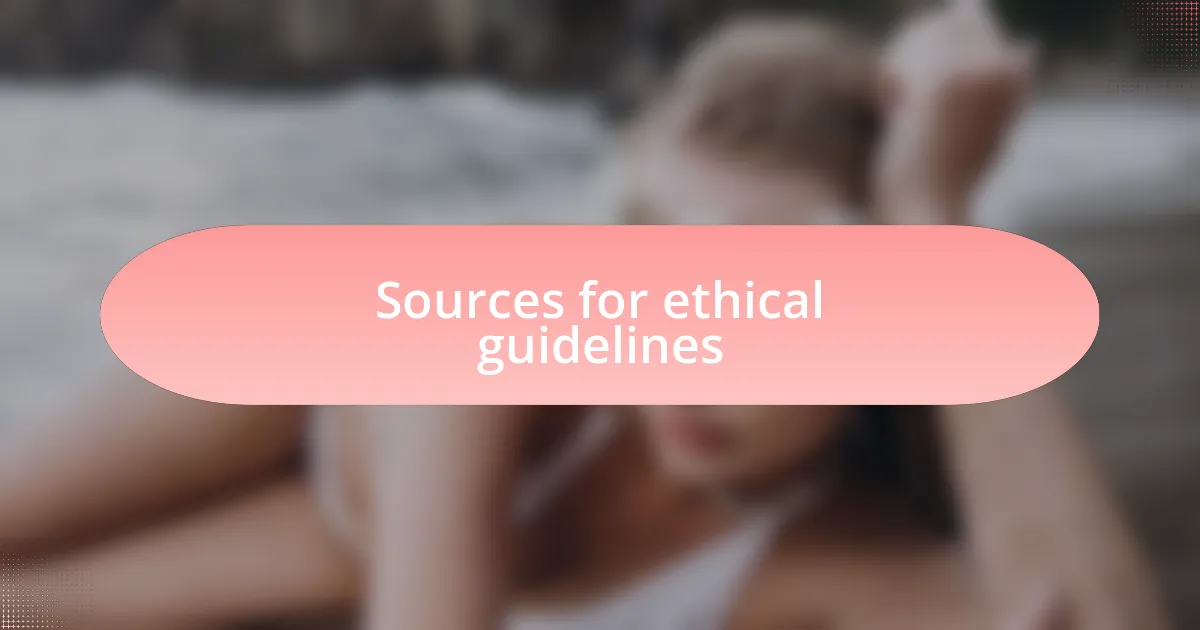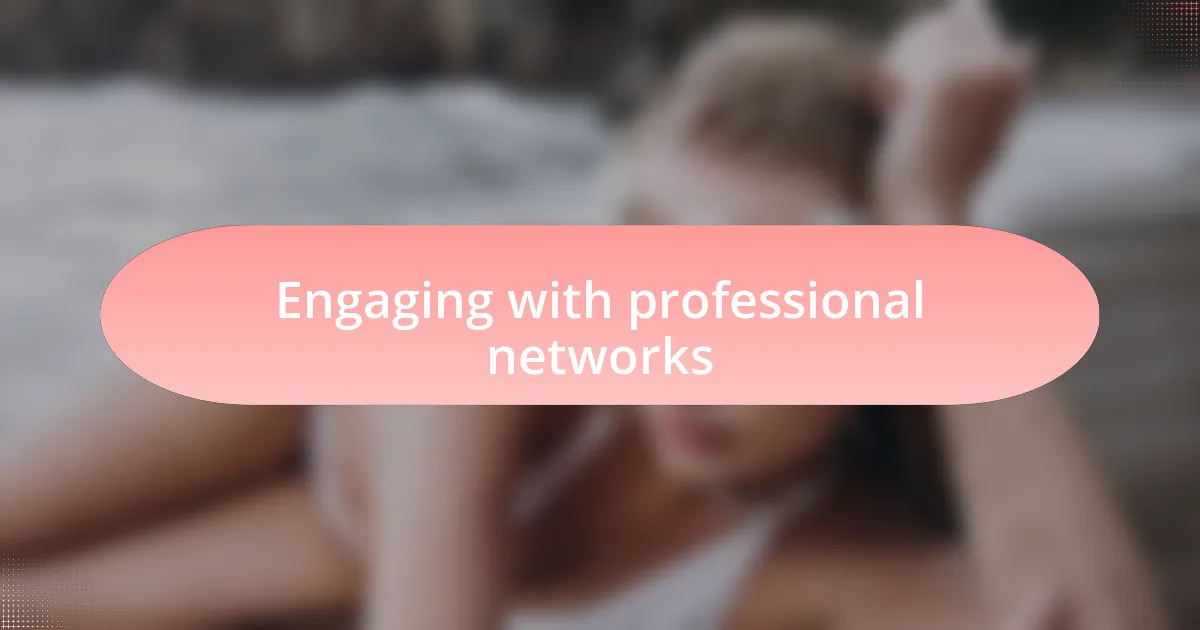Key takeaways:
- Understanding ethical standards in research is essential for participant welfare and maintaining trust in the scientific process.
- Reliable sources for ethical guidelines include established organizations such as WHO and NIH, as well as peer-reviewed journals and workshops.
- Engaging with professional networks and mentorship provides valuable insights and support for navigating ethical dilemmas in research.
- Case studies offer real-world lessons on ethical considerations and their consequences, reinforcing the importance of transparency and integrity in research practices.

Understanding ethical standards in research
Understanding ethical standards in research is crucial to safeguarding not only the integrity of the scientific process but also the well-being of participants. I recall a time during my early days in research when I witnessed a colleague push forward with a study despite clear ethical concerns. It struck me how easily we can overlook principles like informed consent in the rush for results. This experience taught me that ethical standards are more than just guidelines; they are the foundation of trust in research.
In exploring the world of ethical standards, I often find myself questioning, “What would I want for myself or my loved ones in a study?” This perspective fosters a deeper understanding of the ethical principles, such as beneficence and non-maleficence, which prioritize the participants’ welfare. Just thinking about how vulnerable research subjects can be makes me appreciate the rigorous processes in place to protect them.
Moreover, navigating ethical considerations can be an emotional journey. There have been moments when I’ve felt conflicted, torn between the pursuit of knowledge and the responsibility to those involved. It’s a delicate balance, and recognizing the emotional weight of ethical research practices becomes an integral part of my learning. As I delve deeper, I realize that understanding these standards isn’t just an academic exercise; it’s a commitment to humanity itself.

Sources for ethical guidelines
When I seek out reliable sources for ethical guidelines, I often turn to established institutions such as the World Health Organization (WHO) and the National Institutes of Health (NIH). These organizations offer comprehensive resources that reflect both contemporary ethical dilemmas and historical practices. I remember poring over their guidelines while preparing for a critical research proposal, which helped me navigate complex ethical terrains that few textbooks touch on.
Another valuable source is peer-reviewed journals dedicated to ethics in medical research. These publications not only highlight current ethical debates but also provide case studies that resonate with my own experiences. I often find myself reflecting on an article I read that detailed a significant ethical breach; it served as a reminder to remain vigilant and committed to ethical integrity. Is there a more profound lesson than learning from the mistakes of others?
Moreover, attending workshops and conferences focused on research ethics offers an invaluable opportunity to engage with experts and peers. I clearly remember a discussion at a recent seminar that sparked a thought-provoking dialogue about consent procedures. This interactive environment encourages open communication, fueling my desire to stay informed on the evolving ethical landscape. It makes me wonder—how often do we seek out these dialogues in a world that can feel so rushed?
![]()
Tools for tracking ethical updates
To efficiently track ethical updates in medical research, I rely heavily on specialized digital tools like RSS feeds and ethics alert services. Setting up these feeds for journals that focus on ethics has allowed me to receive real-time updates directly in my inbox. I remember the thrill of discovering a groundbreaking ethical guideline when it popped up on my feed; it felt like I was gaining access to a critical resource right at the moment it was released.
Another great tool I use is Google Scholar alerts, which notify me about new research and debates in the field. This means I can stay on top of ethical discussions without manually searching every day. I still recall the excitement when a relevant article appeared, spurring me to re-evaluate my own research methods in light of newly proposed ethical considerations.
To complement these digital methods, bookmarking essential ethics websites is incredibly helpful for quick reference. I regularly revisit sites hosted by reputable organizations, and it’s comforting to know that I can access current information with just a few clicks. Have you ever experienced the satisfaction of finding a well-articulated ethical perspective that resonates with your own beliefs? That’s exactly how I felt when I stumbled upon a thought-provoking blog by a prominent ethicist—it’s a reminder of the importance of engaging with diverse voices in our field.

Engaging with professional networks
Engaging with professional networks has been a game-changer for me in staying current on ethical standards in medical research. When I joined a local chapter of an ethics-focused organization, I was surprised by the wealth of knowledge shared among members. One evening, I listened to a passionate presentation on informed consent that completely transformed my perspective; it highlighted nuances I had never considered before. Have you ever been in a room where the exchange of ideas ignites a new way of thinking? That’s the magic of professional networking.
Through these networks, I often participate in webinars and roundtable discussions that feature seasoned professionals sharing their experiences and insights. I remember sitting in on a discussion about ethical dilemmas in trial design, where real-life examples illustrated the complexities we face. It struck me how invaluable these conversations are; they’re not just theoretical but grounded in the realities we encounter every day. Isn’t it comforting to know that others share your challenges?
Moreover, I find that networking facilitates mentorship opportunities, which can be profoundly enriching. One mentor I met through a conference has been instrumental in guiding my research with a keen eye on ethical practices. The wisdom she shares during our monthly catch-ups often reinforces my commitment to integrity. Building such relationships allows me to benefit from the emotional support and expertise that can only come from someone who knows the landscape well. How often do we overlook the power of mentorship in shaping our professional ethos? It’s a pivotal piece of the puzzle that I hold dear.

Learning from case studies
When I delve into case studies, I often find a treasure trove of real-world applications and ethical considerations. For instance, I vividly recall a particular case regarding a clinical trial that faced scrutiny over participant consent. The detailed analysis not only highlighted the ethical pitfalls but also offered solutions that researchers implemented to rebuild trust. Doesn’t it strike you how these stories can serve as both cautionary tales and guides for our own practices?
I’ve learned that reflecting on case studies allows me to see ethical dilemmas from diverse angles. In one case, a researcher’s choice to bypass certain ethical review processes ended up causing significant backlash. This situation ignited my curiosity about what led to that decision. Was it a momentary lapse in judgement or a systemic issue? The discussion around it underscored the importance of comprehensive ethical training, which is something I now prioritize in my own work.
What really resonates with me is the emotional impact these case studies can have. They don’t just lay out facts; they tell stories of real people and the consequences of decisions made in the heat of research. I remember feeling a mix of concern and determination when I read about communities affected by poorly conducted studies. Such narratives inspire me to uphold high ethical standards and advocate for transparency. How can we learn from these stories if we don’t engage with them deeply?